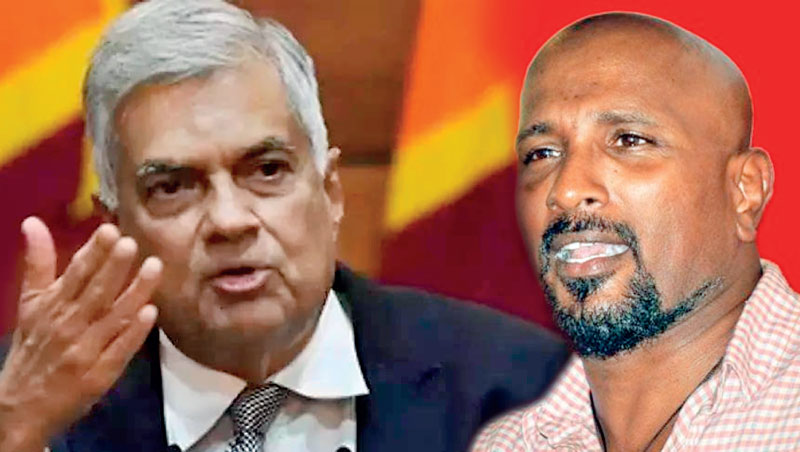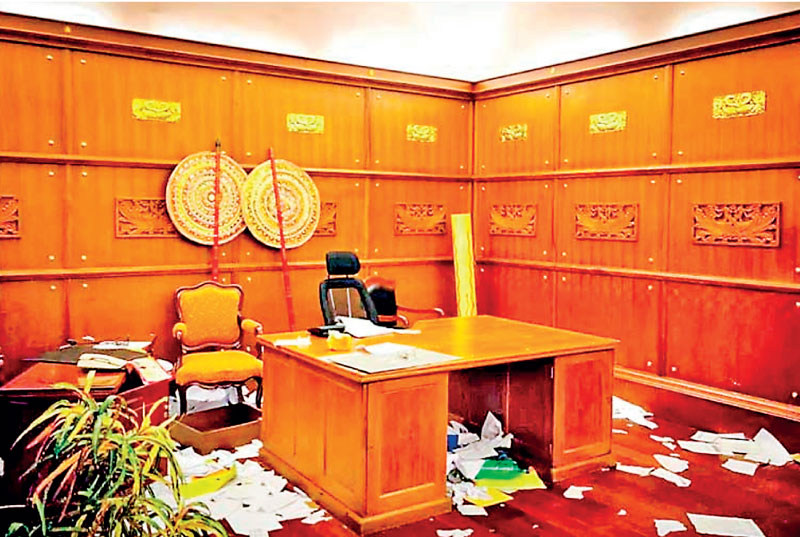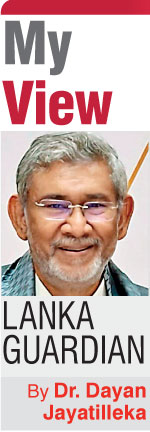Tuesday Feb 17, 2026
Tuesday Feb 17, 2026
Thursday, 1 December 2022 00:10 - - {{hitsCtrl.values.hits}}

President Ranil Wickremesinghe (left) and Kumar Gunaratnam

Papers are scattered everywhere, but there isn’t a smear of blood or a bullet hole, still less a dead body – Pic credit: TIME magazine
|
 I loved The Penguin in Tim Burton’s surreal darkening of Batman. Burton’s new production of the horror comedy ‘Wednesday’ (Netflix, co-produced by MGM) is a perfect gem; a black onyx. It picks up the Addams family story with an indelible performance by California-born Puerto Rican-Mexican teenager Jenna Ortega (an actress since age 6) as the snooty, 16-year-old Goth loner Wednesday Addams, the oldest kid of the family, who has been enrolled in ‘Nevermore’, the Edgar Allen Poe themed boarding school her parents attended. Catherine Zeta-Jones revamps (pun intended) and almost outclasses Anjelica Huston’s classic performances as Morticia. Wednesday Addams goes up against a murderous monster who is discovered as belonging to the category of “Hydes”— derived from the alter ego of Dr. Jekyll in RL Stevenson’s classic.
I loved The Penguin in Tim Burton’s surreal darkening of Batman. Burton’s new production of the horror comedy ‘Wednesday’ (Netflix, co-produced by MGM) is a perfect gem; a black onyx. It picks up the Addams family story with an indelible performance by California-born Puerto Rican-Mexican teenager Jenna Ortega (an actress since age 6) as the snooty, 16-year-old Goth loner Wednesday Addams, the oldest kid of the family, who has been enrolled in ‘Nevermore’, the Edgar Allen Poe themed boarding school her parents attended. Catherine Zeta-Jones revamps (pun intended) and almost outclasses Anjelica Huston’s classic performances as Morticia. Wednesday Addams goes up against a murderous monster who is discovered as belonging to the category of “Hydes”— derived from the alter ego of Dr. Jekyll in RL Stevenson’s classic.
President Wickremesinghe channelled his inner Mr. Hyde, or if you’re into Lou Reed, took a walk on the Hyde side over two days (23/24 Nov.) in Parliament, to a borderline which the J.R. Jayewardene government crossed exactly 40 years ago, when it decided in October-December 1982 that the imperative of accelerated economic growth required the pre-emption of a strong, left-populist (Vijaya Kumaratunga) influenced Opposition in parliament and therefore necessitated the postponement of parliamentary elections scheduled for early 1983.
That pushed Sri Lanka over the precipice in the abyss: July ‘83, the proscription of the JVP, the Northern and Southern civil wars, assassinations and disappearances, torture, terrorism and state terrorism, all of which consumed the lives of a generation on all sides.
In the 1980s, the economy was still resilient enough to keep the system barely afloat during civil wars, but today, in the context of an unprecedented economic crisis, the system and society will not survive.
This time around, if the Supreme Court were to rule unambiguously that the long-deferred Local Government election must imperatively be held on schedule in the first quarter of 2023, preventing or overriding highly probable parliamentary sabotage, the pressure will be released peacefully from within the system, the electoral path of change reaffirmed, and a repetition of catastrophe and carnage avoided.
Losing it
President Gotabaya Rajapaksa didn’t have it most of the time, but President Ranil Wickremesinghe seems to have lost it. In his recent Parliamentary speech, he dinned Dinh Diem into his audience, dramatically declaring:
“…I will not allow any Dinh Diem or those around him…Now they say they are going to start the ‘Dinh Diem Aragalaya’ again. If anyone tries to stage a protest to topple the government, I will not allow it. I will impose emergency law and deploy the military. There is no room for Dinh Diems in this country.”
Ngo Dinh Diem was a South Vietnamese President and dictator; a Roman Catholic in a predominantly Buddhist country who discriminated in favour of the Catholic minority and against the Buddhist majority, thereby triggering self-immolation by Bhikkhus, a guerrilla war and finally, his own assassination.
President Wickremesinghe also denounced alleged attempts by young Bhikkhus to intimidate the hierarchy of the Buddhist clergy. Was this an attempt by him to wrap himself up in the Buddhist flag as a champion of the pre-eminent status of Buddhism in the Constitution against a conspiracy to foist a Catholic dictatorship/dictator on Sri Lanka? The last and only such attempt was the 1962 coup attempt and Ranil’s parents’ UNP wasn’t conspicuously or unambiguously on the correct side of that.
What does Dinh Diem (or an equivalent) have to do with the Aragalaya or contemporary Sri Lankan politics in general? Nothing, nada, zip. What is Ranil Wickremesinghe making a din about?
Elections and economics
In a sinister echo of the disastrous Jayewardene doctrine of Dec 1982 that froze scheduled elections on economic grounds, President Ranil Wickremesinghe categorically declared in his Nov 23/24 remarks to Parliament that the holding of elections would be pegged to and contingent upon the resolution of the economic crisis:
“I will not be dissolving the Parliament. The economy is in a massive problem and once that is resolved we can go for election.”
What if the “massive problem” of the economy isn’t “resolved” even by 2024 when a presidential election is due, or in 2025 when a parliamentary election is scheduled?
Moreover, what is the logical connection between “resolving” the economic crisis and deferring elections?
There was clearly a connection between postponing elections in December 1982, the exacerbation of civil conflict and the economic corkscrew of the late 1980s. Artificially imposed stability actually de-stabilises the system and the economy.
On the other hand, Provincial, Presidential and Parliamentary elections were held in 1988-1989 against the backdrop of two civil wars and a heavily contested external military presence. If 1988-1989 proved anything it is that the spate of elections opened the safety-valves, caused a rotation of both rulers and elites, and thus enabled rapid economic recovery through a re-set.
FSP: New Naxalites
The President gave the Frontline Socialist Party and its leader Kumar Gunaratnam a couple of million bucks worth of free publicity by naming them the driving force of the Aragalaya, scenes of which have made TIME magazine’s 100 top photos of the year.
The photo picked by TIME’s panel of judges shows the desolate office-room of President Gotabaya Rajapaksa at his official residence. Papers are scattered everywhere, but there isn’t a smear of blood or a bullet hole, still less a dead body. There is no graffiti on the walls. No flags or symbols of any political party or organisation. That choice of photo showed how a peaceful non-partisan democratic protest, if large and strong enough, can depose an autocrat from the highest summit.
Referring to the FSP, President Wickremesinghe said: “…After doing so, they would have gone on to capture the Supreme Court…Had they succeeded in taking over the parliament, the government would become a puppet government. That is the reason why I asked the opposition not to be driven by such forces. The public was not with them…”
The road to the carnival of carnage of the 1980s was lined with two frame-ups of the type that is sought to be perpetrated on the FSP; frame-ups in which Cabinet Minister Ranil Wickremesinghe was an articulate parliamentary propagandist.
The first was to outrageously accuse Vijaya Kumaratunga of a “Naxalite plot” – the Naxalites being the armed Maoist guerrillas of India. Vijaya was locked up in an Army barracks until the UNP coercively carried the referendum of December 1982 which blocked parliamentary elections.
Demonisation can be deadly. When Vijaya contested the Mahara by-election in 1984, he lost on the third count having been ahead on an earlier count, after the electricity had gone off while the final count was ongoing. During the campaign, an assassin fired a shotgun blast at Vijaya which killed his bodyguard who sprang to shield him. Purely coincidentally, Ranil Wickremesinghe was political head of the ruling UNP’s by-election campaign in Mahara.
The second, more consequential frame-up was of the JVP which was accused by the Jayewardene administration – overriding dissent in Cabinet by Prime Minister Premadasa and Finance Minister Ronnie de Mel—of perpetrating the anti-Tamil riots of July 1983. The JVP was proscribed. Premadasa wrote a letter to President Jayewardene (leaked to the press) calling for the rescinding of the proscription, but was ignored. The Southern civil war began in 1986.
President Wickremesinghe, a hawkish member of the 1980s UNP Cabinet, accuses the FSP –with zero evidence—of a conspiracy to grab power. If the FSP or anyone else wanted to take anything over, they would have done so on 9 July when, as ex-President Maithripala Sirisena said in parliament, almost half a million demonstrators marched in Colombo and propelled President Gotabaya Rajapaksa into self-exile.
|
Ranil’s dark democracy
Flatly denying that he reached the presidency as a by-product of the Aragalaya, Ranil faulted Gotabaya for his resignation and blamed Opposition Leader Sajith Premadasa for having insisted upon it:
“Mr. Gotabaya Rajapaksa went and took the advice of the Leader of the Opposition. …Don’t blame me. He is the one who agreed to resign from the presidency within a specific, period. So he left after 02 months after I took the oath [as PM]. It was you who told him to leave. So what do I do?”
Though repeatedly ruled otherwise by the Supreme Court, President Ranil’s perspective is that the direct participation of the citizenry in public affairs is permissible only through a referendum:
“…Also, the referendum is the only opportunity where the people can participate directly. No one can go out on the street and cause trouble…When it comes to overthrowing governments, the army cannot stand aside. We cannot sit idly by when our Mahanayake Theros are being threatened. According to Article 09 of the Constitution, the army has the power to stop them.”
Wickremesinghe castigated human rights defenders:
“…Human rights cannot be used to create violence and anarchy. Those who cause violence in the name of human rights cannot be protected…Some claim today that they are the ones who protect human rights. What have they done?...These people claim to protect human rights but live off the money sent from abroad. That is the reality. Can anybody stand up and tell me they didn’t? I know about these people. I have worked with them. I protected them. They are shouting at me today. We cannot allow chaos in the country in this way.”
He removed his mask regarding independent commissions –including the Human Rights Commission of Sri Lanka-- and the privately-owned media:
“Now they are trying to arrest the police officers under the guise of human rights...Human rights cases are filed against the police to stop them from taking action against those who create emergencies and riots. This is not done because of human rights, but to stop the police from taking action against them. So, I asked the Attorney General to look into this. If they do that, the law should be implemented. This game cannot be allowed to continue forever.
Whether it is a military officer or a police officer, we need to protect all of them. Human rights charges were filed and my chief security officer they tried to have him removed…. these people go and ask the Human Rights Commission to remove my main bodyguard…
After I made a statement about this, Sirasa Media Institute sent seven people to attack me. Statements are taken from each person. We will record statements from Duminda Nagamuwa, Vidarshana Kannangara, Dr Nirmal Ranjith Devasiri and others…
…some media also had a hand in the demonstrations…”
In President Wickremesinghe’s view, peaceful demonstrators must conform to the narrowest interpretation of the letter of the law and if they are suspected of not having done so, they can be arrested, prosecuted or kept in detention for months. Not so however, the police and the security forces who must not be subject to constraint or scrutiny. As for Duminda Nagamuwa, Nirmal Ranjith et al, they have transgressed by exceeding the parameters of public expression prescribed by an unelected, unpopular ruler.
Presidential-military junta
President Wickremesinghe is attempting what Donald Trump tried but failed at. The FSP is to Ranil what ANTIFA was to Donald. Trump sought to deploy the US military against the massive demonstrations in support of justice for George Floyd, powered by the Black Lives Matter (BLM) movement. General Mark Milley politely told the President to shove it.
Wickremesinghe openly proclaimed:
“If there are plans to initiate another Aragalaya to change the Government, I won’t give space for that. I will get the military and the forces and I will impose the State of Emergency…”
…I will impose emergency law and deploy the military. There is no room for Dinh Diems in this country…”
Shockingly and implausibly, Ranil’s answer to the country’s tragic, unprecedented brain-drain is to induct the military. He seems to be picking up from where Gotabaya Rajapaksa left off:
“…Today, professionals are leaving this country. That gap can be filled by training our armed forces personnel and sending them to those places. That is why we have reduced the retirement age of military service from 22 to 18 years.”
President Wickremesinghe made a pitch for the military and to the military, which is the real power-base he envisages for himself:
“…The Air Force may have more fighter jets. Drone technology is needed…
I wish we could manufacture a new warship in Sri Lanka. We have that power. Only the money has to be found.
… We want to create a new army in Sri Lanka. To do that, a rapidly growing economy is needed.”
“…It is not possible to come back to the street and ask to topple the government. Everyone in the security forces has a responsibility to protect the government if such a situation arises. Everyone from a Corporal to Field Marshal should work together to protect these institutions. I would like to express my thanks to the three armed forces and the police who are committed to this service.”
The President was quite transparent about the re-structuring of the state that he hopes to undertake, causing a seismic shift in the system’s center of gravity:
“…We need to bring new laws. We will establish the Security Council by law. It is planned to establish the post of National Security Adviser, as well as a National Security Secretariat. Similarly, a tri-forces committee will be appointed for those offices.”
This model quite well-known to Latin America’s democratic leaders, movements and social scientists is the dictatorial National Security State, which in Uruguay took the form of a Presidential-military junta.
Ranil Wickremesinghe’s bottom-line to the military is: I’ll give you fighter jets, drones, warships and a higher legal status despite the economic crisis and whatever the social cost. You must crush resistance from a suffering citizenry and entrench my unelected rulership.
Unfinished Aragalaya
It seemed a trifle premature if not churlish to trash President Wickremesinghe, but not after his Nov 23/24 summoning of Mr. Hyde. His lack of a popular mandate and consequent illegitimacy (as distinct from narrow constitutional legality) is now etched in increasingly sharp relief.
TV news showed a woman demonstrator on a picket-line thanking Ranil for his rant because it had reactivated the Aragalaya spirit. Sajith Premadasa has taken him head-on, getting whistles from large audiences, mainly ex-UNP. The Dullas-GL led FPC has opened a third front in Parliament and the public space. Almost 100 academics (including respected historian Prof. Nira Wickramasinghe) signed a strong denunciation of repression and call for resistance. The Socialist Youth Union (SYU), the youth wing of the JVP, broke Ranil’s restrictions and marched in Kandy. Comrade Gunaratnam has reason to be pleased.
If by legislative chicanery the local authorities election is not held on schedule, it will signify that both the path of peaceful protest as well as that of peaceful electoral change have been blocked. With that dashing of democratic hope, John Locke’s Second Treatise enshrining the citizens’ Right of Revolution will be legitimately activated, with the unfinished Aragalaya resumed and taken uninterruptedly to completion by the people.